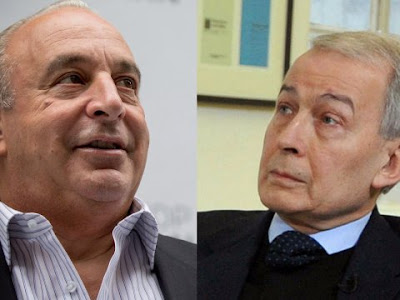“Round Two” – Sir Philip Green and Frank Field set to Renew Hostilities
Here in Financial
Regulation Matters we have focused upon Sir Philip Green and his vast
business empire on a number of occasions, with most posts assessing the downfall
of the British retailer ‘BHS’ and the subsequent fallout that spanned from
that. Frank
Field MP, who chairs the Parliamentary ‘Work and Pensions Select Committee’
has, by way of the Committee’s mandate, come into direct opposition with Green
over the collapse of BHS and the effect on its pension holders, and news today
suggests that they are yet again set to resume hostilities over Green’s
business plans; so, in this post, we will detail what is at issue this time and
look at some of the possible effects that may ensure from this continuation of
investigation.
The collapse of BHS, and Green’s involvement in the
reduction of its pension schemes beforehand, made for a spectacle that was
remarkable, but in reality not surprising. We covered
the account of Sir Philip Green taking a daring approach to being
questioned by Field’s Committee, with the result being that Green contributed
significantly, but not in full, to the pension schemes to bring about some sort
of parity after it was systematically reduced by the company’s leaders over a
period of years. Whilst questions were raised here regarding the effect
of that encounter, particularly in relation to the sentiments that resulted
- i.e. Green’s bluster was both demonstrative of a. his belief in his lack of
wrongdoing and b. his disregard for the threat posed to him, but also in
relation to the sentiments offered for Field, that taking on such a commercial
giant can reap the correct rewards – the outcome was to both secure a
significant portion of the lost pension funds for the pension holders, but also
to bring Green to the stage on account of his business dealings. It has been
noted recently that Green’s Arcadia company, that controls many high street
chains and has nearly
3,000 stores and 26,000 employees worldwide, is under increasing pressure
from online retailers that have forced their way into the marketplace but, of
course, with much less operating cost; as a result, news today suggests that
Green is considering
selling his company to a Chinese firm called Shandong Ruyi. However, for
Field, this raises concerns on the back of Green’s performance with BHS, and it
is for that reason that he has declared that his Committee will ‘look at the state of Sir
Philip Green’s pensions schemes and whether he can sell to whomever he wants…’.
Other reports suggest the reason for this concern, with one source stating that
it is widely rumoured that Arcadia’s
current pension deficit stands at almost £1 billion, which would add weight
to Field’s declaration that it is important to ‘find out what the position
is’ in relation to the current deficit held by Arcadia before any sale can
go through. However, leaving aside the merits of the Chinese company, who
have been making a concerted entrance into the European market of late, a
question posed by Journalists to Field is of more interest at the moment; Field
was asked whether this new investigation might be perceived by Green to be the
confirmation of a vendetta against him, with Field responding ‘I hope it doesn’t’. That
question from the journalist raises some very questions indeed.
On the one hand, it could look like a politician focusing
upon a business leader too much,
particularly as the BHS scandal and its fallout was so recent, but this is a
particularly poor vision to follow. Another way to examine developments would
be a politician, tasked with safeguarding vulnerable pension holders,
fulfilling his mandate that he was elected to carry out, and consistently protecting pension holders
against what has been demonstrated to be particularly venal behaviour. It is
quite illustrative of the problems within modern society that investigating a
business leader who has just had to settle to the tune of £350 million to
replenish funds that he and his company drained, and who sit on an apparently
gigantic pension deficit at the moment, is even potentially considered to be a ‘vendetta’;
it is not, and this shaping of the debate lends poorly to the integrity of
those who advance such degenerative arguments. In reality, Green should have to
declare, at a very early stage, his intentions with regards to the sale and
then a formal and thorough investigation should be commenced; it is very
unlikely that someone who operates in such a manner will leave the company in
great shape for its purchaser, and more importantly its employees. It will be
an interesting scene if Green is put in front of the Committee again, because
his appalling performance last time will surely not be repeated; this is,
however, a logical conclusion to make. The case is that, in reality, if Green
is put in front of the Committee again, he will likely be even worse, and this
come from his understanding that there is no real deterrent for someone in his
position; would Green ever face imprisonment for his actions? We know the
answer to that, and at best he faces a slight reduction in his substantial
wealth which, for a man in his mid-60s, is no real threat at all. Yet, whilst
that is a negative, the positive can be found in Field’s determination to
protect those who cannot protect themselves, and his actions in this continuing
case need to be the model moving
forward. Perhaps the word ‘vendetta’ is correct, but rather it needs to be a
vendetta against those who continue to plunder the system in the belief that
they will not be pursued.
Keywords: Sir Philip Green; Arcadia, Topshop, Retail,
Business, Pensions, Politics, @finregmatters.





Comments
Post a Comment